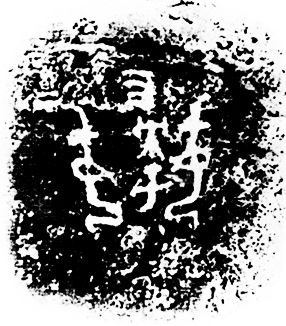Fu Hao 婦好 was the main consort of King Wu Ding 武丁 of the Shang dynasty 商 (17th-11th cent. BCE). She was famous for her military ambitions and personally conducted campaigns against the Tufang 土方, Qiangfang 羌方, Yifang 夷方 and Bafang 巴方. During one of these campaigns she commanded as much as 13,000 troops.
 |
Rubbing of an inscription of a bronze vessel found in the tomb of Fu Hao. From Zhongguo shehui kexue yuan kaoguxue yanjiusuo 中國社會科學院考古學研究所, ed. (1984). Yin-Zhou jinwen jicheng 殷周金文集成 (Shanghai: Zhonghua shuju), No. 11739. |
Her tomb was discovered in 1976 in Xiaotun 小屯村 near Anyang 安陽, Henan, on the site of the last Shang capital, Yin 殷. It contained the remains of human sacrifices as well as a lot of sacrificial vessels with the mark "Fu Hao", and weapons (among others four yue 鉞-type axes that served as a symbol of royal power, see picture to the right). There were in total more than 1,600 pieces of grave furniture. Chinese historians love to call her China's first female general.
In the oracle bone inscripitions her title is Bi Xin 妣辛 "Consort Xin" or Mu Xin 母辛 "Mother Xin".
It is also known that she possessed an own estate from which she presented tributes to the royal court.